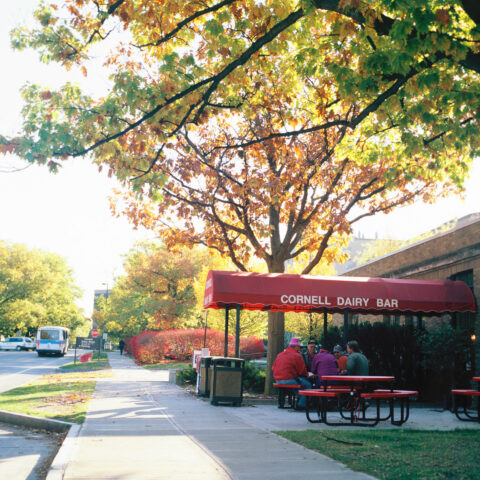5. Retirement and Becoming Emeritus/a
5.1 Retirement Checklist
First Steps
Become Familiar with the University’s Retirement Resources
The Office of Human Resources maintains a pre-retirement planning webpage with links to many important resources. Financial planning and health care planning are central. Good places to start are the benefit overviews specifically for endowed faculty and for contract college faculty. Other valuable sources of information about retirement are colleagues who have recently gone through the process, the Cornell Academics and Professors Emeriti (CAPE), your department chair, and the Cornell Retirees Association (CRA). Generally speaking, it is never too early to begin thinking about the finances associated with retirement. Interaction with Medicare is required several months before your 65th birthday.
Understand How Phased Retirement Works
Eligible faculty members and staff employees may choose to reduce their job duties and scheduled hours prior to retirement, to make a gradual transition before their official retirement date. This is called phased retirement. It requires a signed mutual agreement between you, your department, and the dean of your college. The agreement identifies an official retirement date, a workload percent, and the responsibilities that must be discharged during the phased retirement period. For example, if the workload percent is 75%, then you would receive 75% of your normal salary. In addition to providing a transition to full retirement, a phased retirement has economic value because the university continues to pay benefits as if you were a full-time faculty member.
Identify Your Contacts
There is a measure of non-uniformity across the colleges in terms of just who participates with the candidate during the retirement process. A good way to find out the local arrangements that apply to you is to have a conversation with your college HR representative. Department managers and chairs, and associate deans may also be involved at various stages in the process. Establish clear communication channels to all who are involved.
Interactions with Your Chair
These discussions are typically spread out over time. They should be initiated at least one year before you decide to retire or one year before you plan to enter phased retirement. The idea is for you and the unit head to reach an understanding about resources and other key issues that are of mutual importance. To facilitate these conversations, we provide the following checklists.
A Checklist of Talking Points for You
- anticipated academic interests and activities that may be pursued after retirement.
- the current state of graduate student supervision, how it might continue or wind down.
- the current state of external funding, how it might continue or wind down.
- the state of all discretionary funding accounts that might be utilized after retirement.
- plans for a sabbatical leave before retiring (including teaching or other responsibilities upon return to campus prior to retirement).
- anticipated administrative support needs.
- receiving US mail.
- anticipated desk/space/land line telephone needs.
- anticipated IT support needs.
- the desired level of participation in department business, e.g., staying on mailing lists, attending meetings, participating on committees, voting, etc.
- the desired level of participation in college business, e.g., staying on mailing lists.
- the likelihood of living in the Ithaca area full time, part time, or not at all.
- concerns about indemnification. See link to official policy (formal policy)
- all of the above in the context of a phased retirement agreement.
A Checklist of Talking Points for Your Chair (or Equivalent)
- organizing a recognition event to show appreciation.
- the process for becoming emeritus/a.
- where to get answers to HR-related questions, typically HR office in the candidate’s College.
- the department’s space situation.
- the extent to which the department can supply administrative and IT support.
- the rules associated with attending department meetings and voting on such matters as hiring and promotion.
- the process for accessing reimbursement for professional activities,
- hire-back possibilities that relate to teaching, advising, outreach, and administration.
- opportunities for retirees and emeritus faculty to volunteer.
- how the dean must authorize the continued use of an endowed chair, both as a title and as a possible source of future funding.
- what a phased retirement arrangement might involve.
Formalizing the Retirement Agreement
The dialog with the Chair or Director eventually leads to a retirement agreement. Conversations with central HR or with the College HR person are sometimes part of the process.
If there is a phased retirement plan, it is detailed in writing and signed by you, the chair, and the College dean.
Likewise, if there are resource agreements associated with full retirement, then they should be specified in writing and signed by both you and the head of the unit.
A request for emeritus/a status can only be filed after an official retirement date is set. A guarantee of emeritus/a status is never part of a retirement agreement.
The Actual Transition
Benefit Services will contact you with information about the health care plan for retirees and related matters such as Medicare Parts A, B, and D. They will also describe various life insurance issues that require your attention.
Several months before retirement you should schedule an appointment with your retirement account vendor, i.e., TIAA (1-800 732-8353) or Fidelity (1-800 642-7131).
Upon retirement you should visit the HR Services & Transitions Center in the East Hill Office Building, 395 Pine Tree Road, Suite 130 to obtain an updated Cornell ID that indicates your new status.
5.2 Process for Becoming Emeritus/a
Emeritus/a status is available for associate professors and full professors who have retired.
Process
Upon retirement, a university professor, full professor, or associate professor who has been a tenured member of the University Faculty for ten or more years may be considered for emeritus/a status.
Awarding the title of university professor emeritus/a, professor emeritus/a, or associate professor emeritus/a shall be based upon the career contributions of the candidate through a combination of teaching, research, advising, administration, extension, and outreach. An overall record of meritorious service to the university is expected.
The candidate supplies a curriculum vitae to the department chair together with a cover letter that includes the date of retirement and a request to be considered for either emeritus or emerita status.
If the request is from a full professor, then it is reviewed and voted upon by the full professors and the emeritus faculty in the candidate’s department. If the request is from an associate professor, then it is reviewed and voted upon by the tenured professors and the emeritus faculty in the candidate’s department. The result of the vote and the chair’s recommendation to either approve or deny emeritus/a status is communicated to the dean of the candidate’s college. The dean reviews the dossier and makes a recommendation to the provost.
If either the dean or chair recommendation is negative, then the candidate is so informed by the provost and given the opportunity to respond in writing within ninety days. The final decision to approve emeritus/a status is made by the provost, perhaps in consultation with the dean of faculty and others.
Notes
- The current policy is authorized by Senate Resolution 120 (November 2017).
- “Emeritus/a” is a title modifier, a change authorized by the Board of Trustees (January 2018). See page 23, Article XVII, of the University Bylaws. A retiring professor may become a professor emeritus or professor emerita. A retiring associate professor may become an associate professor emeritus or an associate professor emerita.
- Regarding the vote, the Chair is expected to make a reasonable effort to contact the emeriti. Conversely, emeriti should always make sure that their department has up-to-date contact information.
- Contact the deanoffaculty@cornell.edu if there are special circumstances that make it difficult to execute this policy, e.g., the retiring candidate is the only full professor in the department.
- Holders of certain administrative positions can qualify for emeritus/a status. Rules and process.
5.3 Perks and Opportunities for Retired and Emeritus/a Faculty
| Health | Benefits, Wellness Program, Cornell Health |
| Transportation | Parking on Campus, TCAT Bus, Campus-to-Campus Bus |
| Communication | Email, Zoom, University Directory |
| Campus Life | Library Access, Taking Courses, Attending Events and Lectures, Athletic Events |
| Voting Rights | University Level, College Meetings, Department Meetings |
| Teaching and Research | Office Space, Lab/Experimental Space, Hire-Back, External Funding, Grad Student Supervision, Grad School Professor, Legal Defense and Indemnification, Reimbursement for Professional Activity |
Benefits relate to health, transportation, communication, campus life, voting rights, teaching, and research.
In the following, retired faculty means all retired faculty whether they have emeritus/a status or not. From the WorkDay/HR point of view (a) a retired faculty who does not have emeritus/a status is a retired academic, (b) a faculty member who is on the university payroll is regarded as an active faculty member, and (c) a retired faculty member who is not on the university payroll is regarded as an inactive faculty member.
Health
Benefits
Cornell offers a wide variety of healthcare benefits and programs for retired faculty. There is no mandatory age for retirement for Cornell faculty. However, to receive certain benefits you must be at least age 55 and have ten years of credited service at the university. Details are available in Cornell’s Retirement & Beyond booklet (Contract College Version , Endowed College Version ).
Wellness Program
Cornell Wellness offers opportunities for physical fitness and social experiences, geared towards individuals who are age 50 and over, that are appropriate for every size, shape, and ability. These offerings are great for individuals who are first starting a fitness program, have gone through joint replacement, suffer from arthritis, experience lingering joint pain from injury, have physical limitations or disabilities, and those who want to improve their balance, fitness, overall wellbeing and more. The annual fee is waived for emeritus/a faculty. You must have a Cornell ID card that identifies you as an emeritus/a faculty member when you apply.
Cornell Health
All retirees are eligible for pharmacy services, flu vaccination clinics, and the Faculty and Staff Assistance Program through Cornell Health.
Transportation
Parking on Campus (Ithaca)
All retired faculty who have a current Cornell ID card are eligible for any of the current parking options listed here, subject to availability.
General parking information can be found here.
TCAT Bus Service
Cornell Employees (including temporary employees and affiliates) and retirees can use their Cornell ID card at the fare box when boarding TCAT buses to ride anywhere TCAT goes, any time TCAT runs. Faculty/staff spouses/partners with a Cornell ID card receive unlimited rides on TCAT’s 90s night routes. Details.
Campus-to-Campus Bus Service
Emeritus/a faculty are entitled to the same discounted rate as all non-retired faculty and staff (an active NetID is required). Details.
Communication
Email and Zoom
There are several ways that retirees can continue to receive email using their Cornell netID. There is also access to Zoom that can be used for various campus events and video conferencing.
University Directory
A retired faculty member must have emeritus/a status in order to be listed in the online University Directory. Entries can be edited through WhoAmI.
Campus Life
Library Access
Emeritus Faculty are considered “active faculty” in regard to library access. This implies access to all electronic journals, ebooks, and just about all the databases resources available. Borrowing policies, loan periods and other services specifically for retirees available for retired faculty are described here. For general information, go to the Library Homepage.
Taking Courses
All retired faculty can enroll in up to six credits hours per semester at no charge. Just “sitting in” requires the approval of the instructor. Office of Continuing Education and Summer Sessions handles the registration paperwork. Cornell’s Adult University (CAU) offers unforgettable travel adventures, inspiring summer courses, and youth camps open to all.
Attending Events and Lectures
There are many interesting events on campus each week. Handy ways to keep informed include the Cornell Events Calendar, the Cornell Sun, the CAPE Newsletter, and the Cornell Chronicle. During the academic year, CAPE sponsors a lecture series with monthly talks.
Athletic Events
Emeritus/a faculty and retired faculty (with 25+ years of service) get two free tickets to all athletic events (except Men’s hockey). Admission requires a Cornell ID card that identifies you as an emeritus/a faculty member or as a retired faculty member with 25+ years of service. More information.
Voting Rights
University Level
Emeritus/a faculty can vote in elections for the Dean of Faculty and for candidates who are running for membership on the University Faculty Committee and the Nominations and Elections Committee.
CAPE retains membership in the University Faculty Senate and has a single vote. The CAPE senator or designate is an appointed Executive Council member (or designate). Meetings of the Faculty Senate are open to all retired faculty.
College Meetings
The frequency of college meetings varies considerably from college to college as do voting rights. Consult with your college dean about specific details.
Department Meetings
A department meeting may be about curriculum, requirements, promotion, or hiring. Whether you can attend and vote may depend upon the topic. Consult with your department chair about specific details.
Teaching and Research
Office Space
An emeritus/a faculty member actively engaged in teaching or research may retain a private office at the discretion of the unit, if space is available.
Emeritus/a faculty who remain engaged in unit activities, but not to the extent of specific teaching or research responsibilities, may be provided shared or open plan office space if space is available within a unit. These shared offices are intended to allow an individual to maintain contact with the unit, discipline, and colleagues. Office space guidelines
Laboratory/Experimental Space
An emeritus/a faculty member who maintains an active research program may be provided laboratory space at the discretion of the unit if space is available.
An active research program is characterized by:
- sufficient external funding to support their research activities including the support of technical assistants, post-doctoral fellows, and graduate students.
- continuing contributions to the department’s academic mission and vision;
- demonstrable contributions to the discipline through the propagation of the products of their research in relevant mediums (e.g. books, articles, chapters, patents, presentations, etc.)
Hire-Back
Emeritus/a faculty are eligible for hire-back arrangements for specified periods of time in accordance with the needs of the department and college.
Emeritus/a status is a continuing appointment status, inactive, until a “rehire” appointment is approved.
Hire back arrangements involve a change in employment status and require careful consultation with the Office of Human Resources.
External Funding
Participation as a Principal Investigator is conditional on the availability of resources as determined by the department chairperson, dean, and/or center director. The Office of the Vice Provost for Research is responsible for the policy that governs principal investigator eligibility. Any salary paid to the faculty member in such a case must appear as an approved item in the agreement with the sponsor. Such post-retirement appointments are reviewed periodically and always when a new agreement with a sponsor is proposed.
Graduate Student Supervision
When graduate faculty members retire or resign from the University, they resign their membership on the graduate faculty. Graduate faculty members who retire or resign from the University automatically remain on special committees on which they were serving at the time of retirement/resignation for up to one year.
If the retired faculty member leaves the Ithaca or Geneva area and wishes to remain on a special committee beyond one year, the student must petition to have the former graduate faculty member appointed as co-chair or minor member. If a faculty member resigned from the university and wishes to remain on a special committee beyond one year, the student must petition to have the former graduate faculty member appointed as a co-chair or minor member.
Graduate School Professor
By vote of their graduate fields, emeritus/a faculty may be granted the title Graduate Professor of (Field). This designation, which can be used on external grant and contract applications, enables an individual to retain the rights of other graduate faculty in the field and to submit grant and contract applications that provide up to 50 percent of the individual’s pre-retirement salary.
The General Committee of the Graduate School has approved this title for renewable five-year terms. A Graduate School Professor may continue to serve either as chair or minor member of special committees on which he or she was serving at the time of retirement. Otherwise, a Graduate School Professor may serve only as minor member or co-chair, and only if he or she resides in the Ithaca area and the committee includes a second or minor member in the student’s major field. Details.
Legal Defense and Indemnification
While retirement as an emeritus/a professor does not automatically confer coverage under the University’s Legal Defense and Indemnification Policy, emeritus/a professors may be so covered if they are performing services for the University at the prior written request of the dean of the college or director of the division upon approval by the Provost, even if they receive no remuneration for such services. Coverage would be with respect to claims that arise from authorized duties. To qualify, an individual must also request such defense and/or indemnification and cooperate in the defense of any action or proceeding as provided in the University’s Legal Defense and Indemnification Policy. Formal policy.
Reimbursement for Professional Activity
Upon retirement, emeritus/a faculty members may receive up to $2,000 per year from their college for a period of up to five years for reimbursement of professional activities. Colleges may have specific rules about carrying forward unspent funds. There may also be a requirement about reporting how the funds were utilized.
5.4 Cornell Academics and Professors Emeriti
Founded in 1982, Cornell Academics & Professor’s Emeriti (CAPE) has taken a leading role in fostering social and professional community among retired faculty through varied programs and activities, such as the Lecture Series, Roundtable luncheons, and volunteer programs to name a few.
5.5 Emeritus/a Status for Retiring RTE Faculty
Faculty who retire from certain RTE positions are eligible for emeritus/a status.
Process
In accordance with Faculty Senate Resolution 141 and the Faculty Handbook’s corresponding addition of Section 5.5, Emeritus/a Status for RTE Faculty Process, eligible individuals may request emeritus/a status upon retirement if they have served Cornell for 10 or more years in the following Research, Teaching, and Extension (RTE) faculty titles:
- senior lecturer
- senior research associate
- senior extension associate
- professor of the practice
- associate professor of the practice
- research professor
- associate research professor
- clinical professor
- associate clinical professor
- senior scientist
- senior scholar
- research scientist
- principal research scientist
- librarian
- associate librarian
- archivist
- associate archivist
Eligibility for RTE emeritus status is reserved for those who have served in a qualifying RTE title at Cornell for 10 or more years and who retired from the university after June 30, 2020. The awarding of emeritus/a status for eligible RTE faculty shall be based upon the career contributions of the candidate through teaching, research, advising, administration, extension, and outreach. It is understood that only a subset of these activities is relevant to a particular title. An overall record of meritorious service to the university is expected.
Prior to the established retirement date, the candidate initiates the request in writing to their department chair or unit head, to include the date of retirement and a request to be considered for either emeritus or emerita status. An updated curriculum vita should accompany this request.
The university and RTE faculty in the candidate’s unit who have University Voting Rights should review the case and vote, following the unit’s current established practice. The result of the vote and the department chair or unit head’s recommendation to either approve or deny emeritus/a status is communicated to the dean of the candidate’s college. The dean reviews the file and either approves or denies the request. For a candidate whose appointment is outside of the colleges, the role of dean shall be played by the appropriate vice provost or by the University Librarian if the candidate is appointed in the library.
If the dean approves the request, the unit is responsible for communicating the outcome to the faculty member.
If either the department chair or unit head recommendation is negative, then the candidate is so informed by the dean upon a negative decision the faculty member has the opportunity to respond in writing to the dean and department chair with additional information within 90 days. The final decision to approve emeritus/a status for retiring RTE faculty members is made by the dean, perhaps in consultation with the department chair, dean of faculty, or others.
Upon final approval, a unit representative sends an email to hrpayrollsupport@cornell.edu with the RTE faculty member’s name, title to be conveyed in retirement (please be sure to confirm the faculty member’s preference for the use of emeritus or emerita), unit, department, and effective date of emeritus/a status. Please also notify the Dean of Faculty and CAPE offices by copying deanoffaculty@cornell.edu) on this email. The process is considered complete when the Workday transaction has been processed by the HRIS team.








